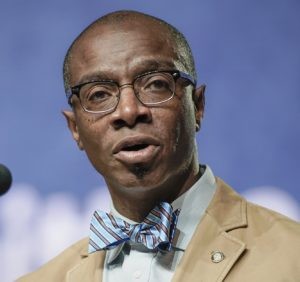The Southern Baptist Convention is now on record discouraging use of the term “gay Christian” to describe believers who experience same-sex attraction but choose celibacy because they believe the Bible permits sex only between a man and woman in the context of marriage.
An SBC resolution adopted this week in Birmingham, Alabama, “On Sexuality and Personal Identity” addresses Christians who “have tried to affirm God’s design for sexuality while embracing a personal identity as ‘gay Christian’ or a ‘sexual minority.’”
“This self-understanding and self-expression is open to misinterpretation, affirms a sinful desire as a marker of personal identity, and may imply that one’s sanctification would preclude the possibility of deliverance from same-sex sexual desire,” the resolution reads.

Curtis Woods, chairman of the Southern Baptist Convention Resolutions Committee, gives the committee’s report June 12. (SBC newsroom photo by Marc Ira Hooks)
It recommends “that Christians refrain from describing themselves or embracing a self-identity in ways that suggest affirmation of sinful desires or unbiblical social constructs” and calls on “Christians who struggle against same-sex attraction to forsake any self-conception or personal identity that is contrary to God’s good and holy purposes in creation and redemption.”
The resolution, drafted by a committee, superseded a statement recommended by messenger Steve Kern, pastor of Olivet Baptist Church in Oklahoma City, opposing Revoice, a support group for “gay, lesbian, bisexual, and other same-sex-attracted people who adhere to historic, Christian teaching about marriage and sexual expression.”
Kern described the ministry, which sparked controversy last year by meeting in a conservative Presbyterian church in St. Louis, as an “LGBTQ+ Christian movement” dedicated to “the queering of the church by convincing church leaders that sexual orientation and sexual minorities are viable identities for Christians.”
A statement in Wednesday’s SBC Daily Bulletin said the Resolutions Committee “deemed it best not to condemn this specific conference.”
“The committee chose instead to address the central matter of the controversy by presenting a resolution on sexual desire and personal identity that combines biblical wisdom and pastoral sensitivity,” said the committee chaired by Curtis Woods, associate executive director of the Kentucky Baptist Convention currently serving as co-interim executive director.
Denny Burk, a seminary professor and president of the Council on Biblical Manhood and Womanhood, said the resolution passed by the convention borrows language from the Nashville Statement, a declaration signed two years ago by numerous Southern Baptist leaders denying, among other things, that “adopting a homosexual or transgender self-conception is consistent with God’s holy purposes in creation and redemption.”
“The resolution’s dependence upon Nashville is clear,” Burk commented in a blog June 13. “It is also clear that the SBC just went on record to affirm the exact same perspective that Revoice was founded to oppose.”
“The Resolutions Committee and thousands of SBC messengers spoke loud and clear on this,” Burk said. “This was an unambiguous declaration by Southern Baptists. They are not in favor of the theological perspective underwriting Revoice.”
Previous stories:
‘Nashville Statement’ condemns LGBT Christians and those who support them
Nashville Statement controversy goes Dutch
Response to Nashville Statement says the gospel not just for heterosexuals
State Baptist group says Nashville Statement is ‘without error’
Related commentary:
